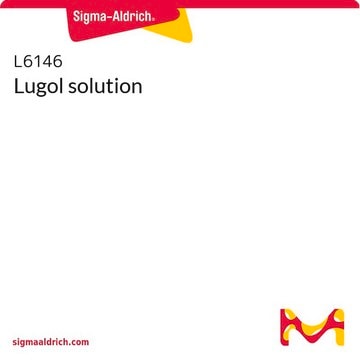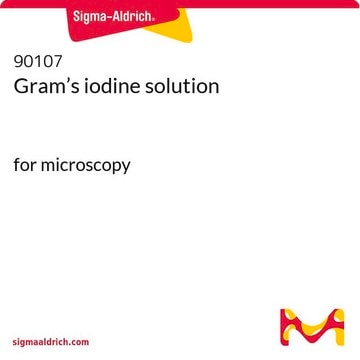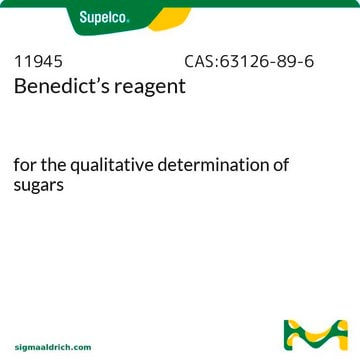32922
Lugol solution
according to Lugol
Sinónimos:
Iodine/Potassium iodide solution
About This Item
Productos recomendados
form
liquid
Quality Level
quality
according to Lugol
density
1.006 g/cm3 at 20 °C
application(s)
diagnostic assay manufacturing
food and beverages
hematology
histology
storage temp.
room temp
SMILES string
[K+].[I-].II
InChI
1S/I2.HI.K/c1-2;;/h;1H;/q;;+1/p-1
InChI key
XUEKKCJEQVGHQZ-UHFFFAOYSA-M
¿Está buscando productos similares? Visita Guía de comparación de productos
Categorías relacionadas
General description
Application
- Lugol′s solution is generally used as a mordant in Gram staining, and for fixing invertebrate blood cells and protozoa.
- It is suitable for the detection of starch in plants.
- It has been used in a study to assess narrow-band imaging without image magnification for detecting high-grade dysplasia and intramucosal esophageal squamous cell carcinoma.
- It has been used in a study to determine its benefit in aiding the detection, presence, and spread of small squamous cell carcinomas of the esophagus.
Biochem/physiol Actions
Features and Benefits
- Ready-to-use solution.
Principle
Storage Class
10 - Combustible liquids
wgk_germany
WGK 2
flash_point_f
Not applicable
flash_point_c
Not applicable
ppe
Eyeshields, Gloves, multi-purpose combination respirator cartridge (US)
Certificados de análisis (COA)
Busque Certificados de análisis (COA) introduciendo el número de lote del producto. Los números de lote se encuentran en la etiqueta del producto después de las palabras «Lot» o «Batch»
¿Ya tiene este producto?
Encuentre la documentación para los productos que ha comprado recientemente en la Biblioteca de documentos.
Los clientes también vieron
Nuestro equipo de científicos tiene experiencia en todas las áreas de investigación: Ciencias de la vida, Ciencia de los materiales, Síntesis química, Cromatografía, Analítica y muchas otras.
Póngase en contacto con el Servicio técnico










